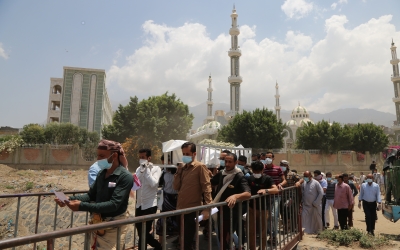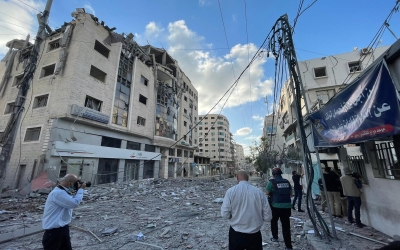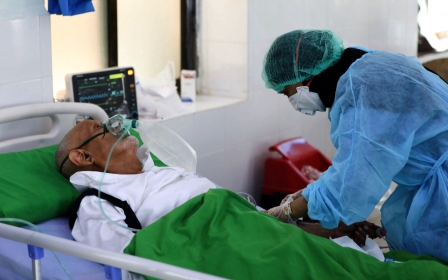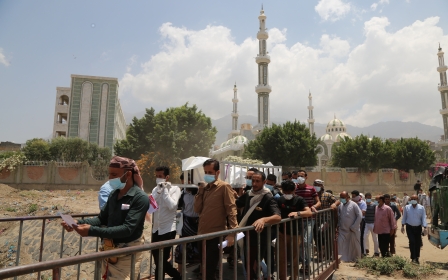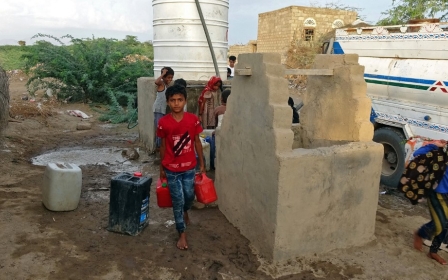Covid-19 in Yemen: Fear of AstraZeneca vaccine side effects linked to low turnout for jabs
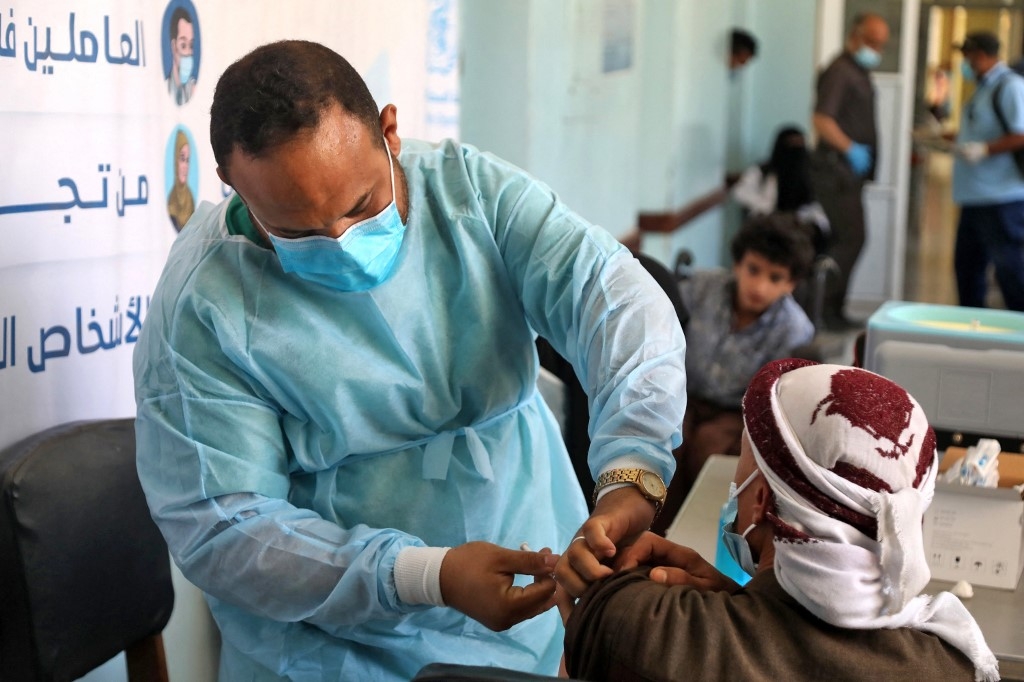
In Yemen, the concern about the possible side effects of the AstraZeneca vaccine is causing many people, including health workers, to refrain from taking the jab.
Yemen, home to 30 million people, received its first 360,000 doses of the AstraZeneca Covid-19 vaccine in late March from Covax, a global scheme to provide jabs to countries in need.
It was the first batch of a total of 1.9m doses that Yemen will receive in 2021, according to Unicef. These are planned to be distributed free of charge to health workers and other priority groups to combat the rampant virus.
Yemen's six-year war has restricted testing and reporting, with the Houthis, who control most large urban centres, having provided no figures since an initial few last May.
'We hear that this [AstraZeneca] vaccine has been banned in advanced countries so I don’t want to take it'
- Riyadh, Yemeni health worker
The vaccine is now available in all provinces under the control of the internationally recognised government, but the majority of Yemenis are not willing to take it.
“I am a health worker. I had Covid-19 last year and recovered from it, but we hear that this [AstraZeneca] vaccine has been banned in advanced countries so I don’t want to take it,” Riyadh, a health worker in Taiz province, told Middle East Eye.
He stated that many health workers around the country were equally worried about the vaccine and that is why they had refused to take it.
“The majority of Yemen's more than 100,00 health workers have not taken the vaccine,” he said, explaining that he takes precautionary measures to protect himself against the virus.
As of Monday, only 18,555 people had received the jab since the beginning of the vaccination campaign on 20 April 2021, according to a health ministry spokesperson.
She said that the ministry had not registered any deaths because of the vaccine, stating that the campaign was ongoing in 13 provinces with the cooperation of the World Health Organisation and Unicef.
The committee had recently urged authorities to declare a public health "state of emergency" in the war-torn country due to the surge in deaths and infections from the pandemic.
Lack of awareness
Mohammed al-Faqeeh, deputy head of the infection prevention department at al-Thawra Hospital in Taiz and a supervisor of a vaccination committee, stated that the turnout for the Covid-19 vaccine was very low, attributing the reason to an absence of awareness.
“The vaccination centres opened on 20 April but there was no awareness and education about the importance of the vaccine, therefore many people didn’t realise how important it is to be immunised,” he told MEE.
He said that the centre in Taiz saw up to 15 people per day, but that the turnout was usually lower.
Faqeeh said that the vaccine rollout was planned to be exclusively for health workers, elderly people and people with underlying health conditions, but then it had been extended to anyone over the age of 20 due to the low number of people coming forward.
Unicef has backed an awareness campaign through TV and radio stations, but that campaign has failed to convince people to change their minds.
'I think there will be better turnout in the coming months as some people are waiting to see the side effects on people who took the vaccine'
- Adam al-Goaidi, Taiz doctor
“I don’t expect any good turnout for the vaccine after Eid unless there is hard work on raising the awareness of people,” said Faqeeh.
Adam al-Goaidi, a doctor at an isolation centre for Covid-19 patients in Taiz, stated that the main reason behind the low turnout was the rumours about the vaccine.
People are hearing that the vaccine may lead to death, and many advanced countries stopped using it, so the majority of Yemenis were worried, he said.
“I think there will be better turnout in the coming months as some people are waiting to see the side effects on people who took the vaccine, and if there is nothing fatal they will take the vaccine,” Goaidi said.
The Supreme National Emergency Committee for Covid-19 said last week that there had been more than 6,400 cases and 1,276 deaths since the outbreak of the virus last year, but the real figure was likely to be much higher.
The vaccine is only available in areas under the control of the internationally recognised government, and is not available in the Houthi-controlled areas.
Ishraq al-Subaie, Yemen’s deputy public health minister, said on 24 April that Houthi authorities had refused to receive the vaccine, while Sanaa authorities have yet to comment.
Covid-like side effects
Rafat Abdu, 30, was aware that the vaccine was available to his age group, but he was not ready to have the vaccine.
“I’m a healthy man and I don’t suffer from any disease, so why should I take a vaccine that may cause me serious side effects,” he told MEE.
Abdu said that one of his relatives took the vaccine and suffered from fever and pain for three days, saying that it was similar to the pain caused by Covid-19.
Khaled, in his 60s, took the vaccine as soon as he heard about its availability in Taiz. But he says that for two weeks he suffered from symptoms similar to Covid-19.
“I thought the vaccine was a good thing that would protect me from Covid-19, but I suffered from something similar to the virus after taking the vaccine,” he told MEE.
“It may not be Covid-19 but it is something similar or worse, as I had severe fever and pain in the muscles and bones.”
Khaled, who is well-educated, used to advise people to take the vaccine. Now, he believes that healthy people can bear Covid-19.
“I advise healthy people not to take the risk of the side effects of the Covid-19 vaccine, but let’s leave it for people with chronic diseases to take it in hospitals under supervision.”
He said that people who took the vaccine should not be allowed to leave the centre immediately afterwards.
“I don’t doubt the vaccine itself but rather the healthcare. I think all people who take it need to be tested before taking it and stay under medical supervision for a certain period after being inoculated.”
Middle East Eye propose une couverture et une analyse indépendantes et incomparables du Moyen-Orient, de l’Afrique du Nord et d’autres régions du monde. Pour en savoir plus sur la reprise de ce contenu et les frais qui s’appliquent, veuillez remplir ce formulaire [en anglais]. Pour en savoir plus sur MEE, cliquez ici [en anglais].


